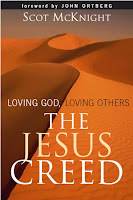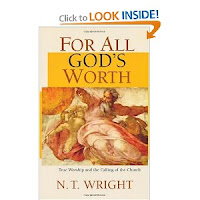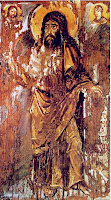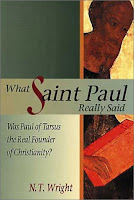 Michael Gorman is professor of Sacred Scripture and Dean of the Ecumenical Institute of Theology at St. Mary's Seminary & University in Baltimore, Maryland; he as authored numerous books including Apostle of the Crucified Lord: A Theological Introduction to Paul and His Letters (Eerdmans, 2004), Reading Paul (Cascade, 2008), and Inhabiting the Cruciform God: Kenosis, Justification, and Theosis in Paul’s Narrative Soteriology (Eerdmans, 2009). Dr. Gorman graciously answered some questions regarding Paul and his views on justification.1. Can you tell us, briefly, about when and how you became a Christian?
Michael Gorman is professor of Sacred Scripture and Dean of the Ecumenical Institute of Theology at St. Mary's Seminary & University in Baltimore, Maryland; he as authored numerous books including Apostle of the Crucified Lord: A Theological Introduction to Paul and His Letters (Eerdmans, 2004), Reading Paul (Cascade, 2008), and Inhabiting the Cruciform God: Kenosis, Justification, and Theosis in Paul’s Narrative Soteriology (Eerdmans, 2009). Dr. Gorman graciously answered some questions regarding Paul and his views on justification.1. Can you tell us, briefly, about when and how you became a Christian?I became a Christian through a United Methodist youth group in my town when I was 15. It was the verbal and life-witness of friends who brought me to faith, though the initial moment of conversion was at what we used to call a “youth rally.” The experience almost made me a lifelong Calvinist, however (I’m a Methodist, but I was a Presbyterian for 10 years), since I feel like I was called and transformed without much if any conscious volitional act on my part. This is jumping ahead, but I think Tom Wright would appreciate that understanding of call/conversion very much. I do, too, obviously, yet I don’t think it conflicts with the interpretation of justification in Paul that I have offered.
2. Paul can sometimes seem very intimidating to Christians. Where is a good place to start reading Paul (i.e. his own letters, other resources, etc.)?A great place to start reading Paul is with a very brief letter like Philippians and/or a very practical and relevant one like 1 Corinthians. Ephesians is also a good starting place, in spite of some people’s reservations about authorship. As for secondary sources, I tend to recommend my own Reading Paul and Tom Wright’s What St. Paul Really Said. Mike Bird’s little book (Paul: A Bird’s Eye View) is also good.
3. When did you first develop an interest in studying Paul?My interest in Paul developed in seminary at Princeton in the early 1980s, when there were a number of fine Pauline scholars teaching, including the late J. Christiaan Beker, Paul Meyer, and Martin De Boer. They all influenced me profoundly, but it was a course in NT Ethics with the late Cullen Story that got me interested in Pauline ethics, which led to my PhD. dissertation, also at Princeton, under Meyer and then De Boer. The thesis of that work became the basis of everything I’ve done on Paul ever since.
4. For many Christians when they think of Jesus they think of things like "love, mercy, compassion, etc" and when they think of Paul "doctrine, justification, and sometimes division." Is that a fair representation of Paul (and Jesus for that matter)?Interesting question! I think that both Jesus and Paul were agents of God’s inauguration of the new age (in very different ways, of course—only Jesus died and was raised to make it happen), which Jesus usually called the Reign of God and Paul understood as the Lordship of Jesus. Both were about the business of creating a new community of people who embodied the covenant loyalty and love expected in the Scriptures but made possible only by the advent of the Spirit. “Love, mercy, compassion” are traits of God that both Jesus and Paul understood, taught, and practiced, but they also each knew that God calls and forms a holy covenant people. Paul’s “doctrines” are all very practical and pastoral, not just ideas to be thought about. Justification is about resurrection from the dead, sort of like the parable of the prodigal son. Division? Jesus said, “I came not to bring peace but a sword.” Sounds pretty divisive! In other words, while I see differences between Jesus and Paul (one is Lord, one is not), they are not the ones people often point to. Bonhoeffer is helpful here: (The Cost of) Discipleship is in many respects a book about the similarities between Jesus and Paul.
5. In your book "Reading Paul" you offer an amazing one sentence summary of Paul. Let's see if you can go even shorter. How would you summarize Paul in a twitter (140 characters)?Jesus is God’s crucified and resurrected Messiah and Lord whose Spirit creates communities of cruciform faith, hope, and love in anticipation of final salvation.
(That’s 138.)
6. There is a lot of discussion today about what the gospel actually is. Some people focus on the kingdom, some on justification, some on both. Can you tell us what the gospel is according to Paul in a nutshell (something that is easy to memorize)?That’s a tough one. Why not memorize 1 Cor 15:3ff? But the previous answer would not be a bad paraphrase.
7. Why is it so important that we see the writings of Paul rooted in his Jewish heritage?Paul simply cannot be understood apart from his self-understanding as the agent of the God revealed in the Jewish Scriptures and the Jewish Messiah.
8. Paul seems to talk a lot about "righteousness". What does it mean that God is righteous and how does it relate to Christians today?Righteousness, or justice, is a fairly all-encompassing term about the unique character of God as morally different from humanity (“holy”), good, faithful to covenant, and both willing and able to save. Throughout the Scriptures, the righteous God calls a people to share in the divine righteousness. Participation in Christ’s death and resurrection makes that possible. For us today, that means lots of things, but above all that by the power of the Spirit we begin to share in God’s loyal and loving character revealed in Christ. Or, as I have said with respect to holiness in Paul, “You shall be cruciform for I am cruciform” (God speaking).
9. There is a lot of talk today about the doctrine of justification. When most people think about this doctrine they think of a forensic declaration. Can you comment on what justification is and what is good/not so good about the traditional understanding?Let me quote from Reading Paul: “Justification is the establishment of right covenantal relations—fidelity to God and love for neighbor—by means of God’s grace in Christ’s death and our co-crucifixion with him. Justification therefore means co-resurrection with Christ to new life within the people of God now and the certain hope of acquittal, and thus resurrection to eternal life, on the day of judgment.” Somewhere else in the book I write, “Whatever else justification means, it means participation in the life of this one God of the covenant who reigns supreme and deserves our loyalty.” In Inhabiting the Cruciform God, therefore, I argue that justification is theosis (defined below).
There is more than one “traditional understanding” of justification, but my biggest objection to most of them is that they privilege the law court metaphor and make it into a narrowly defined doctrine of individual declaration and acquittal. How one can read Gal 2:15-20 and limit justification to that idea is rather mind-boggling. There, justification is about membership in the community (new perspective) and also about participation in Christ as a death-to-life reality. And even Abraham, the proof-text paradigm of justification, is presented in Romans 4 as one whose justification meant resurrection from the dead. Fortunately, most theologians and even many traditional interpreters of justification in Paul are seeing a close connection between justification and participation than in the past. (See, for example, my quote from Tom below.)
10. How are justification and resurrection related?Well, the previous answer gives some of my perspective, but I would also add that justification is connected to life, and life for Paul comes, paradoxically, only through death—Christ’s and ours. Justification is new life—resurrection from death to life by sharing in the death and resurrection of Christ.
11. In a recent interview N.T. Wright stated that your work has been very influential on his as he is writing his new book on Paul. In what ways do you hope to see Wright "change/tweak" his views on justification in light of your work?First, I am flattered that Tom would say that. We have talked and corresponded and listened to each other’s papers and read each other’s work quite a bit over the last decade. In his book Justification, he rightly says that “the notion of ‘being in Christ’ which Paul develops in these chapters [Romans 6-8] is rooted in, and fully dovetails with, the doctrine of justification. It is not the case, in other words, that one has to choose between ‘justification by faith’ and ‘being in Christ’ as the ‘centre’ of Paul’s thought. This is so close to my interpretation of Paul that I would be very happy if Tom consistently said and unpacked this. But sometimes he reverts to more traditional language, over-emphasizing the law court metaphor (though less individualistically than most) of “declaration” (in the covenant community”) and even using the language of imputation (as in his IVP lecture when the book came out). Somewhere in Justification he speaks of Christ’s death and resurrection being “reckoned” to us, based on Romans 6. I find this deeply problematic. Christ’s death and resurrection is the reality in which we participate; it is not something reckoned to us.
So… I guess I hope Tom will begin using participationist categories and language to describe justification, or do so more consistently.
12. You frequently use the term theosis and I know that sometimes people can have a hard time with it. What do you mean by it?Here’s my definition, which is what I mean by it with reference to Paul, from Inhabiting the Cruciform God:
Theosis is transformative participation in the kenotic, cruciform character of God through Spirit-enabled conformity to the incarnate, crucified, and resurrected/glorified Christ.
Theosis means becoming like God. I know that some people object to the language of theosis. I am less concerned about that specific word than I am the content of the definition. The patristic theological claim was that “He became what we were so that we might become what he is.” This is much more central to Paul than most interpreters have recognized. It’s a good summary of some key Pauline texts. Bonhoeffer is again helpful here. The conclusion of Discipleship is such an interpretation of Paul, and I refer to it at some length in the end of Inhabiting.
13. Do you have any other "Paul projects" in the works?I will be giving the Lund Lectures at North Park Seminary in September on the theme of “Re-Imagining Justification,” and that is, God willing, part of a larger project with (probably) the same name. I also have a book on Pauline spirituality for ministry somewhere in production. But first I need to finish my book on Revelation—in less than two months!
Thank you Dr. Gorman for taking the time to answer all these questions!



















